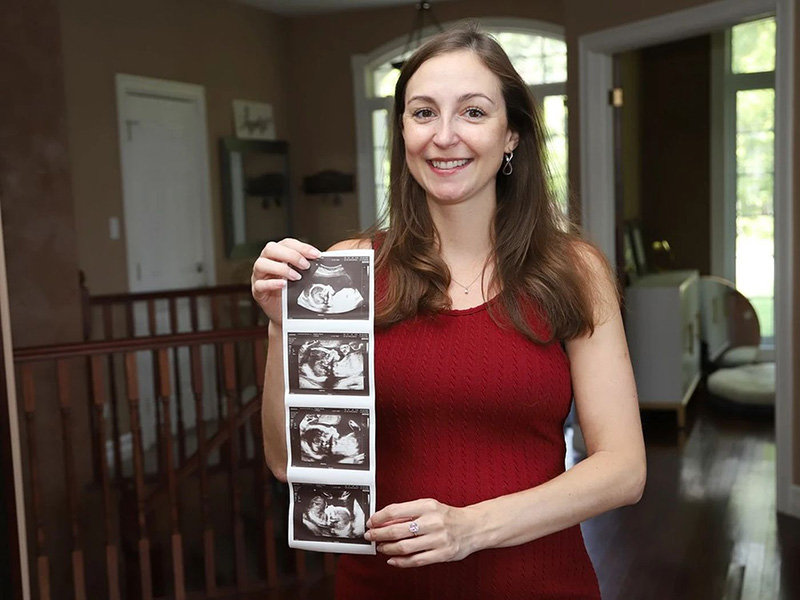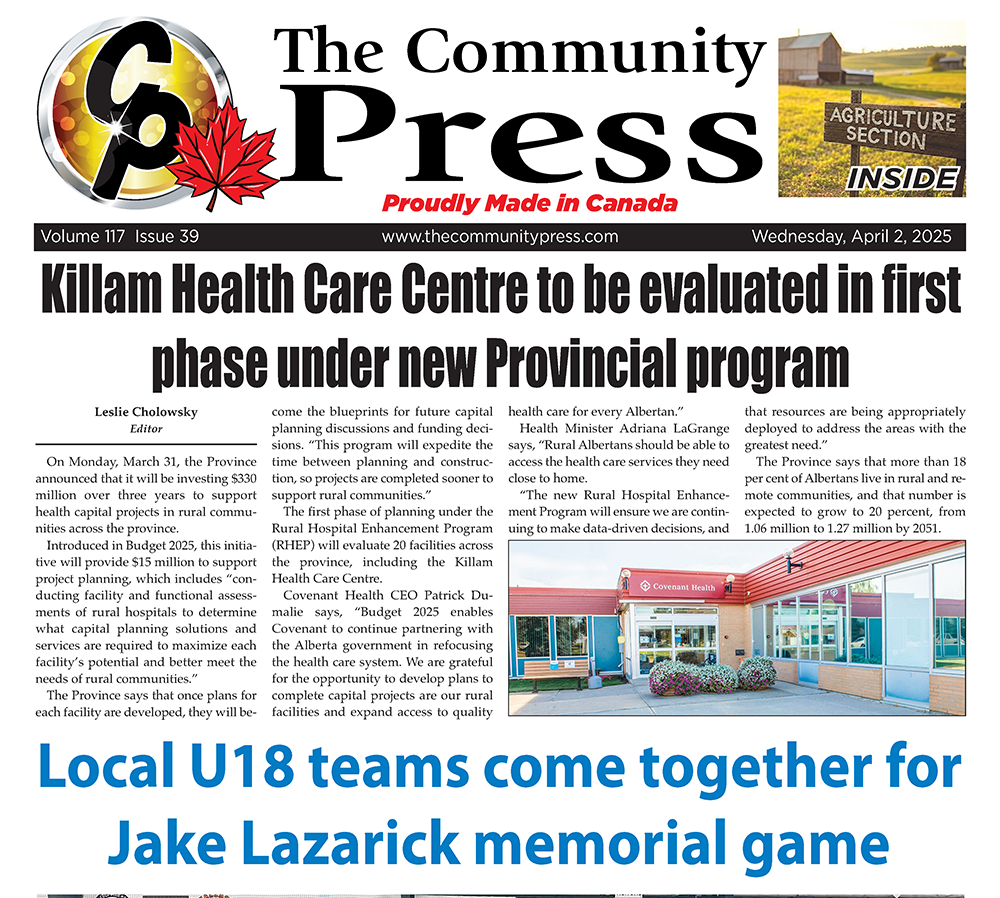The high cost of getting pregnant in Northern Ontario

Laura Stradiotto,
Local Journalism Initiative Reporter
Sitting in her Garson home rubbing her pregnant belly on a hot summer day, Renee Higgins says she wants to share her journey to parenthood to highlight the challenges experienced by one in six Canadians who struggle with infertility.
Higgins says she has spent years, a life savings and extensive travel time navigating fertility care in the province. As an advocate for better fertility care in Northern Ontario, she wants to make it easier for future parents faced with the same circumstances to access services in their own community, without having to take out a second mortgage, like she and her husband did to pay for travel and in-vitro fertilization (IVF) treatment in southern Ontario.
“We had been trying to have a baby for four and a half years,” said Higgins, who will welcome a baby boy in October. “We didn’t have anyone in our family that struggled with fertility and had no idea that we would. It caught us completely off guard. I was 31 and thought that was young in fertility years. I was focused on my career, house and savings. We always knew we wanted to build a family. We were just waiting for the right time.”
Higgins said she tried various treatments before her doctor suggested IVF. Then during IVF, she suffered two miscarriages — an immeasurable loss, she explained — before being successful in the seventh cycle while under the care of the Markham Fertility Centre.
The Ontario Fertility Program covers part of one IVF cycle per life for Ontarians. In Higgins’ case, that represented a $10,000 savings from a $30,000 cycle. However, less than half of people are successful their first try. Higgins went through seven IVF cycles and spent more than $100,000 in treatment, medication and travel before she was successful.
“I am so lucky that our story is ending the way that it is,” she said. “We had actually decided that if this didn’t work, we would have to walk away for financial reasons.”
Case complex
Higgins was originally under the care of NEO Women’s Health Centre in Sudbury, which specializes in fertility care and covers some frontline treatment. The centre has a partnership with Anova Fertility in Toronto where patients travel. But Higgins case was so complex, that after a few unsuccessful IVF cycles, they told her that there was nothing more they could do to help. That’s when she contacted the Markham Fertility Centre, which specializes in cases like hers.
“The Sudbury fertility clinic is really great for the majority of people who find success without going to the more complex IVF treatments, but then at a certain point, you have to travel,” she said. “This isn’t unlike other medical conditions — we are used to this in Northern Ontario. But with fertility, there are two additional layers that make it more challenging and frustrating.”
Applications she filed to cover travel costs through the Northern Health Travel Grant Program were denied, even though she was seeking medical care in southern Ontario because the same care wasn’t available in the North. Higgins appealed the decisions but was unsuccessful.
However, she added that she’s heard from some applicants in the same circumstances who have been able to access travel grants.
Secondly, Higgins said, the ultrasounds and blood work required during IVF treatment cannot be done in Sudbury. Even though those services are available here, the services required are very specialized, and last-minute access is not possible, said Higgins.
“What people end up doing is driving all the way to Toronto,” she said. “It is very short notice. For us, we had to do over 50 drives to Toronto through the course of seven IVF cycles.”
Higgins would wake up at 3 a.m., drive to Toronto through any type of weather, obtain an ultrasound and bloodwork at the Markham clinic, pick up her medication, then drive home, return to work the next day, only to do it all over again every two days.
“My employer is very understanding and flexible,” she said. “I realize not everyone has that opportunity and that is why I volunteer my time to advocate so that we can get a monitoring clinic in Sudbury open. No matter what IVF centre you go to for treatment, you can do your ultrasounds and bloodwork here.”
Higgins said a monitoring centre would allow a person going through IVF to get their ultrasound and bloodwork done before their workday starts, or at a time that supports work-life balance, saving travel costs, time off work and the stress of travel. She would like to see one monitoring centre open in Sudbury as a pilot project and if successful, for the province to roll it out across Ontario.
Higgins has chronicled her journey on social media and joined the board of directors for Conceivable Dreams, an Ontario non-profit fertility patient advocacy organization.
She realizes fertility care is expensive but says investment will repay itself in lifetime tax returns from future residents.
“I want to put my face out there and try and make a difference and help other people so this can be easier down the road for the next Sudburians,” she said.
A Northern Ontario issue
Dr. Maevys Garcia, a fertility specialist and medical director of the Markham Fertility Centre, sees many patients, including Higgins, who travel from across Northern Ontario to seek fertility care at her centre.
“Accessing fertility care is difficult for many Ontarians but it’s particularly difficult for people in Northern communities,” she said, “and that is because there are no IVF centres in northern communities – all the IVF centres in Ontario are located in the GTA area.”
Travelling so far means increased costs, more time off work and “creates an extra barrier” to fertility treatment, she said.
Garcia agrees with Higgins, that Northern Ontario patients need access to more resources.
“It’s not really feasible to open IVF centres in the Northern communities because those are very specialized clinics but one thing that could be helpful is funding for travelling, more travel grants from the government for patients who have to travel for fertility treatments,” said Garcia. “Another thing would be satellite monitoring locations in the North. It would be fantastic if the government helped with some of those costs as well to facilitate assisted care for patients in the North.”
While IVF patients need to be at the clinic for embryo retrieval and transfer, she said, the monitoring required to get to that point can be done in Northern communities, provided services are available there.
Problem recognized
The Sudbury Star contacted the Ministry of Health to inquire about the type of support available to Northern Ontarians who access fertility care and IVF out of town.
As well, The Star asked whether the province was considering establishing satellite monitoring locations across the region.
In an email response to the Star, Hannah Jensen, a spokesperson for the Ontario Minister of Health Sylvia Jones, reiterated the support program available to Ontarians experiencing fertility challenges but acknowledged the out-of-pocket expenses incurred during treatment.
“Through the Ontario Fertility Program, our government invests $70 million each year to provide 13,000 patients and families with in vitro fertilization (IVF), artificial insemination (AI) including intra-uterine insemination (IUI), and fertility preservation (FP) services,” Jensen said in her email response. “This funding includes supporting clinics in communities like Sudbury, Windsor, Thunder Bay, and Kitchener-Waterloo so families can connect to the services they need in their community.
“Our government knows some Ontarians are spending too much time trying to navigate the healthcare system and travelling too far to access care. That is why we are continuing to improve the Ontario Fertility Program in communities that need it most to ensure patients and their families can have convenient access to treatment and care wherever they live.”
Jensen said the Northern Health Travel Grant Program also supports people in Northern Ontario in accessing medical specialist services or ministry-funded health care facility-based procedures unavailable in their local communities within a radius of 100 km by providing reimbursement for eligible travel expenses.
“The (grant program) includes reimbursement for referral to a fertility clinic participating in the Ontario Fertility Program (OFP) for publicly funded services,” she said. “As part of our government’s 2024 budget, we are investing an additional $45 million through this program to connect more people to the specialized care and services they need.”
Laura Stradiotto,
Local Journalism Initiative Reporter
The Sudbury Star






